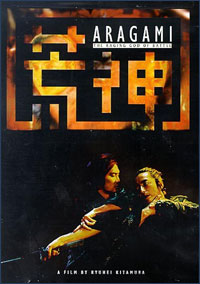Aikido
'Way of Harmony with the Universal Energy'. Developed from 1931 by Ueshiba
Morihei in his first dojo, the Kubokai. A modern Budosport aiming at
self-defence, with techniques from Ju-Jutsu, Ken-Jutsu,
Naginata and Daito-Ryu. He was opposed to the Ju-Jitsu 'hand-to-hand combat' and
prefered to keep a distance from his opponent. He kept however the speed and the
precision that he found in the Ju-Jitsu techniques. Avoiding the attack and
turning the force of an opponent against himself are the basic principles. Many
techniques are inspired by the the old sword-fighting, but without using the
weapon. Thus Aikido is the art of unarmed combat against an armed opponent.
Ueshiba was very religious and let his techniques be influenced by his
'feeling of harmony towards all men'.
Aikido contains about 700 movements more or less derived from basic Kata-forms:
consisting of freeing oneself from grips (Te-hodoki), throwing an opponent to
the ground by pressure on the limbs (Rofuse), and finally immobilizing by
pressure on the joints (Kansetsu-gaeshi). These 3 series of movements are
the basis of all self-defence.
Some Martial Arts historians place the origin of Aikido with the Samurai
of the Kamakura-period (1185-1333). The fundamental techniques were
codified by the famous warrior Minamoto no Yoshimitsu (1045-1127). The
Takeda-family of the Aizu clan perfected the combat-techniques (Aiki-Jutsu) and
also defined the vital or weak points of the human bodyl. By stricking them
(Atemi) an enemy could be place at one's mercy.
Complete Aikido-training sometimes consists of the use of the short Jo,
the medium Tambo and the long Bo.
In 1948 the Aikido Association, the Aikikai, was founded.
Also http://home.zonnet.nl/lute24/ for an extensive vocabulary of Aikido. Unfortunately only in Dutch.
Ali *
Highly political movie where the camera moves through the mind of Mohammad Ali
in his drive to be the Greatest. Although he is still rather thin Will Smith's
performance is one of his best. Will Smith, Jamie Foxx, Jon Voight. Director:
Michael Mann.
2001.
Ame Agaru *
Just before his death in 1998 Akira Kurosawa finished the scenario for this
movie. His assistent Koizumi finished this stylish picture as a tribute to the
mastery of Kurosawa.
The story tells about the samuraimaster Ihei Misawa. Strangely enough his superb
skill with the sword is the reason why he cannot find a master. Still he will
find a new master who will appreciate his qualities. Akira Terao, Yoshiko
Miyazaki, Toshiro Mifune, Mieko Harada. Director: Takashi Koizumi.
1999.
Anzawa-ryu
Traditional school of Naginata, invented in the seventeenth
century as a weapon for women.
Aragami ***

Ancient Japan. Fleeing from enemies, two wounded samurai arrive
at a strange old temple in a remote location in the mountains. The doors to the
place are opened by a beautiful and exotic woman, who beckons them inside.
Unable to walk any further, they collapse from exhaustion. One of the samurai
awakens to find himself miraculously healed. He meets his saviour, a mysterious
man who tells him that his friend died from his wounds. The samurai is persuaded
to stay the night. His host tells him the legend of the "Tengu", a goblin which
is said to reside in the mountains dining on the flesh of men. He goes on to
reveal the true name of the Tengu : Aragami. When the samurai asks if Aragami
poses a threat to the temple, his host answers : "I am Aragami". The only way
for the Samurai to leave the temple is to destroy Aragami.
Takao Osawa, Masaya Kato, Kanae Uotani. Director:
Ryuhei Kitamura. 2003.